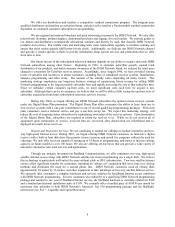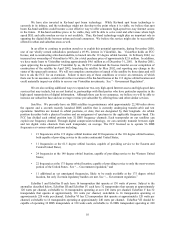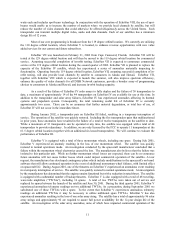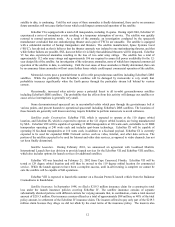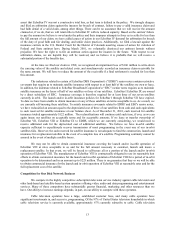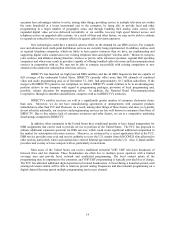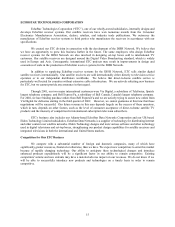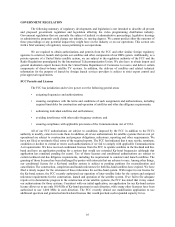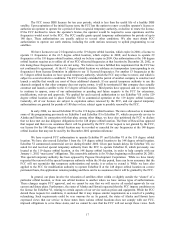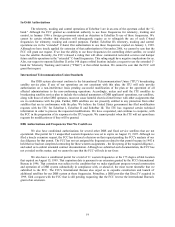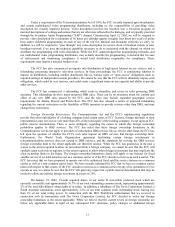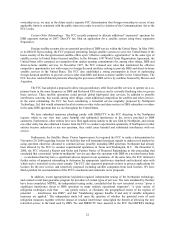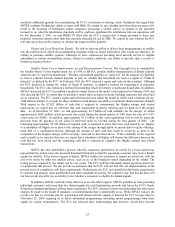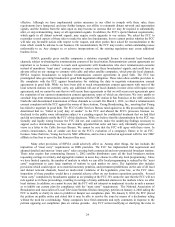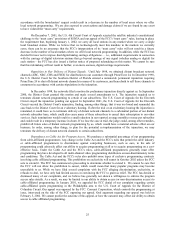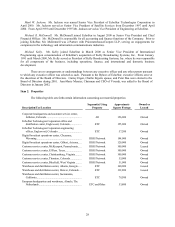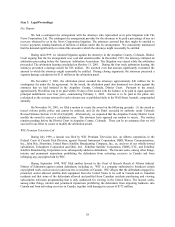Dish Network 2001 Annual Report Download - page 21
Download and view the complete annual report
Please find page 21 of the 2001 Dish Network annual report below. You can navigate through the pages in the report by either clicking on the pages listed below, or by using the keyword search tool below to find specific information within the annual report.19
In-Orbit Authorizations
The telemetry, tracking and control operations of EchoStar I are in an area of the spectrum called the “C-
band.” Although the FCC granted us conditional authority to use these frequencies for telemetry, tracking and
control, in January 1996 a foreign government raised an objection to EchoStar I’s use of these frequencies. We
cannot be certain whether that objection will subsequently require us to relinquish the use of such C-band
frequencies for telemetry, tracking and control purposes. Further, EchoStar II’s telemetry, tracking and control
operations are in the “extended” C-band. Our authorization to use these frequencies expired on January 1, 1999.
Although we have timely applied for extension of that authorization to November 2006, we cannot be sure that the
FCC will grant our request. If we lose the ability to use these frequencies for controlling either satellite, we would
lose the satellite. Recently, the FCC released a ruling that will allow commercial terrestrial services and hamper
future satellite operations in the “extended” C-band frequencies. This ruling might have negative implications for us.
Also, our request to operate EchoStar II at the 148 degree orbital location includes a request to use the extended C-
band for Telemetry Tracking and Control (“TT&C”) at that orbital location. We cannot be sure that the FCC will
grant that request.
International Telecommunication Union Standards
Our DBS system also must conform to the International Telecommunication Union (“ITU”) broadcasting
satellite service plan. If any of our operations are not consistent with this plan, the ITU will only provide
authorization on a non-interference basis pending successful modification of the plan or the agreement of all
affected administrations to the non-conforming operations. Accordingly, unless and until the ITU modifies its
broadcasting satellite service plan to include the technical parameters of DBS applicants’ operations, our satellites,
along with those of other DBS operators, must not cause harmful electrical interference with other assignments that
are in conformance with the plan. Further, DBS satellites are not presently entitled to any protection from other
satellites that are in conformance with the plan. We believe the United States government has filed modification
requests with the ITU for EchoStar I, EchoStar II and EchoStar III. The ITU has requested certain technical
information in order to process the requested modifications. We have cooperated, and continue to cooperate, with
the FCC in the preparation of its responses to the ITU requests. We cannot predict when the ITU will act upon these
requests for modification or if they will be granted.
DBS Authorizations and Frequencies That We Could Lose
We also have conditional authorizations for several other DBS and fixed service satellites that are not
operational. One permit for 11 unspecified western frequencies was set to expire on August 15, 1995. Although we
filed a timely extension request, the FCC has deferred a decision on that request pending the FCC’s analysis of our
due diligence for that permit. The FCC has not yet assigned the frequencies related to that permit because in 1992 it
held that we had not completed contracting for these western assignments - the first prong of the required diligence -
and asked us to submit amended contract documentation. Although we submitted such documentation, the FCC has
not yet ruled on this matter, and we cannot be sure that the FCC will rule in our favor.
We also have a conditional permit for a total of 11 western frequencies at the 175 degree orbital location
that expired on August 15, 1999. That expiration date is pursuant to an extension granted by the FCC’s International
Bureau in 1996. That extension was subject to the condition that we make significant progress toward construction
and operation of a DBS system substantially in compliance with, or ahead of, the most recent timetable that we
submitted to the FCC. The FCC’s International Bureau also urged us to expedite construction and launch of
additional satellites for our DBS system at these frequencies. PrimeStar, a DBS provider that DirecTV acquired in
1999, filed a request with the FCC that is still pending requesting that the FCC reverse the International Bureau’s
grant of an extension.


